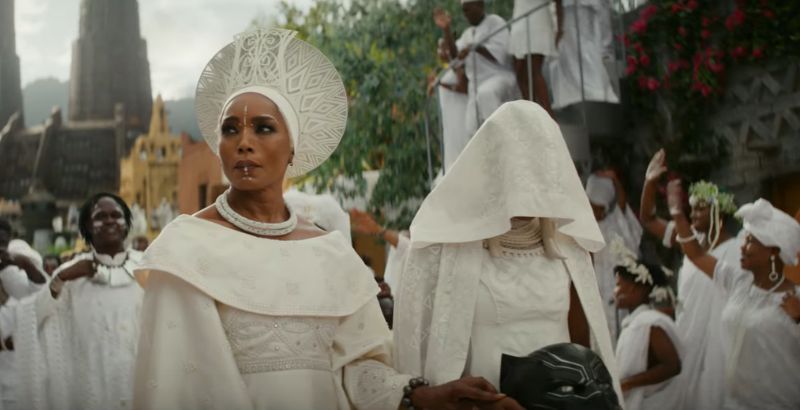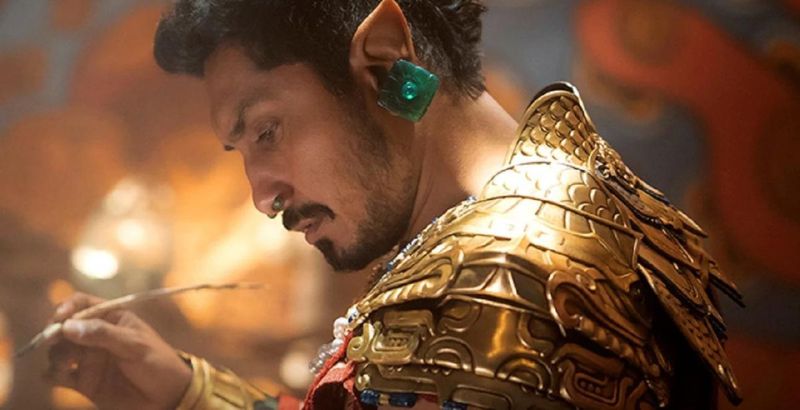
Black Panther: Wakanda Forever is directed by Ryan Coogler and written by Coogler and Joe Robert Cole. A follow-up to Black Panther, the world it finds itself in is forever changed, but not by the Snap as we’ve seen in previous films in the Marvel Cinematic Universe (MCU), but by personal loss in a more intimate form. In this film, Queen Ramonda (Angela Bassett), Shuri (Letitia Wright), M’Baku (Winston Duke), Okoye (Danai Gurira), and the Dora Milaje (including Florence Kasumba) fight to protect their nation from intervening world powers in the wake of King T’Challa’s death. Facing personal grief, we see how each character endures that while facing the real external threat of outside nations wishing to exploit and take Wakanda’s resources. As the Wakandans strive to embrace their next chapter, the heroes must band together with the help of Nakia (Lupita Nyong’o) and Everett Ross (Martin Freeman) and forge a new path for the kingdom of Wakanda. At the same time, Namor (Tenoch Huerta) brings a new problem to their doorstep.
While the action is top-notch, and we finally get an MCU film without extensive questionable CGI, Wakanda Forever doesn’t lose itself in it. Coogler is much more focused on telling a story about the emotions that drive violence, not the violence itself. For starters, Angela Bassett, as Queen Ramonda, is a powerhouse. We all know how perfect she is when it comes to portraying emotion with the smallest of movements.
A lip quiver, a tear, the way she holds herself, stoic and yet filled with emotion, Bassett acts with every piece of herself, and her grief, her pain, and why she continues to endure is not only resonant but one of the two most powerful elements of the film. Even though we see Shuri move through grief in her own way, blending tradition with science and choosing her own path, her story is shaped in and out by Ramonda. It’s a potent exploration of a mother-daughter relationship and puts Bassett as Wakanda’s heart, even as Shuri begins to stand on her own in the final act.
Bassett’s powerfully emotional performance isn’t the only acting highlight of the film either. Tenoch Huerta is a force of nature. He is beautiful and powerful, and he contains a ferocity in him that aims to burn the world to protect his people. While Black Panther showed Wakanda struggling with isolationism and removal from the world stage, Wakanda Forever shows the repercussions both for Wakanda and the newly emerged Talocan while also particularly critiquing the “West” and the United States for its lineage of violent exploitation of indigenous people.
Sure Talocan itself is protected from intervention, but it is the product of escaping genocide. It is not untouched by Spanish colonizers but shaped by it, created as the only way to survive without being killed or enslaved. So Namor’s anger makes sense, as much as his attempted manipulation of Wakanda into an alliance does. And for me, maybe because I saw Indigenous characters fighting to stop the past from repeating, I found it hard to root against Talocan and its warriors, given my background. That complexity is a dynamic complication that helps Wakanda Forever be more than just a standard superhero story about good and bad guys. Instead, it pushes its audience to think about the ripples history creates in the present.
There are small moments that Coolger works in for Namor to explore the sadness that fuels his aggression towards the surface. When he breathes in Wakanda’s unpolluted air. When he arrives to bury his mother, only for her home to be forever changed and his people in ropes when he explains to Shuri how and why Talocan exists. His rage isn’t just rage for the sake of it; it’s fear too. And while the script does a fantastic job of allowing these spaces of complexity, it’s Huerta Meija’s acting ability to switch from a powerful king that can pluck planes from the sky to a king scared for his people and seeing the past repeat itself, only this time, under his watch.
All this heavy emotion is only facilitated by the change of Namor from the king of Atlantis to the god of Talocan. K’uk’ulkan to his people—the Yucatec Maya deity, the war serpent—he carries with him a name and burden. Additionally, while I was skeptical of the MCU taking Yucatec Maya, and Mayans in general, and treating them as a lost civilization (a common racist trope that ignores that the Maya still exist and are under anti-Indigenous persecution and violence in both Mexico and Guatemala), that doesn’t happen here. Instead, we see an existing Indigenous village that allows the audience to understand that the Maya and indigenous Mexicans aren’t a mythological past but a living, breathing people.

Now, Wakanda Forever isn’t perfect. When the film tries to remind the audience of how it connects to the rest of the MCU, especially when specific lines of dialogue seem forced in to do so, it loses itself. The constant need to force connections instead of telling a story strikes again with one-liners and moments that break up an otherwise emotionally potent script. Thankfully, those moments are few and far between and never present when Wakanda Forever explores its deeper themes of grief, enduring it, and the lengths we go to in order to protect those we love or avenge them.
That said, unlike Multiverse of Madness which also introduced a new character and used as little more than a prop, Wakanda Forever manages to introduce two, and each of them is central to both the narrative and the themes. While Riri Williams’ role in this film is to stoke the tension between Talocan and the surface world, she is still handled like a dynamic character with her own motivations and emotions, even if the latter doesn’t always match the quick timeline we see. That said, Coogler perfectly introduces a new empire and culture with the same reverence and care as he did when we first saw the veil lifted from Wakanda.
Without mincing words, Wakanda Forever has circumstances mounted against it. From the sudden death of its titular character and the delayed production due to Wright’s anti-vax and anti-trans Twitter post to the challenge of having to widen the world of the MCU by introducing an entire civilization, it was an uphill battle. But instead of pushing the boulder up and falling under it, Coogler, his team, and the actors who brought this story to life manage to blast the MCU open and actually provide a story that doesn’t just resonate emotionally but also restructures the very core dynamic of how the world functions in the MCU. And all of this had to be done while the cast and crew were grieving the loss of Chadwick Boseman, who was, to the audience, the Black Panther but also their friend.
While Wakanda Forever directly reflects Boseman’s death by almost replicating the circumstances in the story, it’s done so with reverence and never feels like exploitation. In many ways, it was clear that actors were not acting as their characters cried or grieved. And while that is heartbreaking to know, I hope that representing it on screen helped those who actually knew him to work through their grief, and that’s what matters. This is their love letter to him, and that is clear.
At this point in the review, I’ve written over 1000 words, yet there is still so much more to be said and unpacked. Stellar costuming, fantastic score and soundtrack, and even the implications of what the finale means for the future of the MCU, but I’m going to stop here. Ultimately Black Panther: Wakanda Forever is a sequel, yes, but it is also a reflection of themes, conflicts, and grief that we saw in the first movie. But this isn’t a bad thing. While the film’s elements directly mirror the past, Wakanda Forever dives deeper into it all. It creates a world stage with dangerous implications that raise the stakes for Wakandans and the rest of the surface world.
Black Panther: Wakanda Forever is in theaters nationwide November 11, 2022.
Black Panther: Wakanda Forever
-
Rating - 9/109/10
TL;DR
Black Panther: Wakanda Forever is a sequel, yes, but it is also a reflection of themes, conflicts, and grief that we saw in the first movie. But this isn’t a bad thing. While the film’s elements directly mirror the past, Wakanda Forever dives deeper into it all. It creates a world stage with dangerous implications that raise the stakes for Wakandans and the rest of the surface world.






